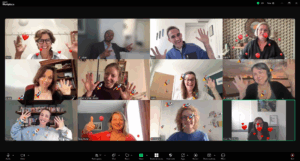The world of leadership is changing. Gone are the days when a leader’s role was simply to issue instructions and expect them to be followed. Today’s leaders must do more than manage tasks—they must facilitate collaboration, create alignment, and inspire innovation.
This shift demands a new approach: leading as a coach.
Coaching leaders strike the balance between vision and co-creation. They state their direction with confidence but invite their teams into the process, fostering a culture of shared ownership and engagement. At CRR UK, we believe that this way of leading isn’t just effective—it’s essential in today’s complex and ever-changing world.
Let’s explore why leading as a coach is so powerful, what skills are needed, and how the Organisation and Relationship Systems Coaching (ORSC™) series can equip leaders to guide teams through uncertainty with clarity and connection.
What Does It Mean to Lead as a Coach?
Leading as a coach doesn’t mean stepping back from decision-making. Instead, it means: Balancing authority with collaboration—the leader sets the vision but engages the team in the ‘how.’
Shifting from telling to asking—using powerful questions to unlock solutions from within the team.
Creating an environment where people feel heard, valued, and empowered.
Instead of saying, “Here’s what we’re doing,” a coaching leader might ask, “What’s the best approach to achieve this goal?”
This approach fosters psychological safety, encouraging teams to take responsibility and be creative, rather than simply following orders.
The Power of the Coaching Stance in Leadership
Many leaders struggle to create alignment in their teams because they don’t know how to facilitate conversations that bring people together.
This is where Designed Team Alliances (DTA) come in—one of the key tools from the ORSC methodology.
A DTA is a structured conversation that establishes how a team wants to work together. It creates clarity around shared values, expectations, and agreements, ensuring alignment before conflicts arise.
Yet many leaders don’t know how to facilitate this kind of conversation. And many professional coaches don’t know how to effectively partner with leaders to embed these practices in organisations.
Leading as a coach means having the confidence to guide teams through these conversations, rather than assuming alignment will happen naturally.
Without a DTA: Teams work with hidden expectations that lead to misunderstandings and conflict.
With a DTA: Teams co-create agreements, leading to smoother collaboration and stronger relationships.
Example: Before launching a major project, a leader facilitates a DTA to establish how the team will navigate challenges, rather than waiting for tensions to surface later.
Key Skills Leaders Develop Through Coaching Training
To lead as a coach, leaders must develop specific skills, many of which are taught in ORSC:
1. Asking Open Questions
Moving from “Here’s what I need you to do” to “What’s our best way forward?” encourages ownership and critical thinking.
2. Holding Space for Collaboration
Leaders learn to tolerate uncertainty and trust the team’s process rather than controlling every detail.
3. Facilitating Alignment
Using tools like DTA and Alignment Coaching, leaders can create clarity, trust, and shared commitment.
4. Managing Conflict Constructively
Instead of avoiding or escalating conflict, coaching leaders use systemic approaches to uncover deeper issues and address them collaboratively.
5. Seeing the Bigger Picture
ORSC-trained leaders think systemically, considering relationships and group dynamics rather than focusing solely on individual performance.
Instead of shutting down disagreements, a coaching leader uses Alignment Coaching to help teams surface and resolve differences productively.
Why Coaching Leaders Are More Effective in Today’s Complex World
Leaders who coach don’t just get better results—they create workplaces where people want to thrive.
The Impact of a Coaching Leadership Approach:
Higher Engagement: Coaching cultures see 39% higher employee engagement (Gallup).
Greater Profitability: Coaching-driven organisations report 21% greater profitability (Harvard Business Review).
Stronger Retention: 86% of companies embedding coaching report a strong return on investment (ICF).
By shifting from a transactional to a relational leadership style, coaching leaders build trust, resilience, and innovation—all crucial in today’s uncertain world.
ORSC: The Ultimate Training for Coaching Leaders
The ORSC series is designed for leaders, coaches, and facilitators who want to masterfully lead any relationship system—whether a team, organisation, or partnership.
Across five modules, leaders learn:
How to create alignment and trust within teams.
How to navigate conflict with confidence.
How to unlock collective intelligence for innovation.
How to lead with clarity in times of uncertainty.
Leaders who train with ORSC become experts in holding complexity, managing change, and building relationships that drive real results.
The Future of Leadership is Coaching
In today’s world, leaders can no longer rely on authority alone—they must develop the ability to inspire, align, and co-create.
Leading as a coach isn’t just a skill—it’s a transformative way of working.
At CRR UK, we equip leaders with the tools they need to:
Facilitate alignment and trust.
Navigate complex challenges with confidence.
Lead high-performing, engaged teams.
Now is the time for leaders to embrace this new way of working—and for coaches to partner with them in creating real systemic change.
Are You Ready to Lead Differently?
Explore the full ORSC series and develop the coaching skills that will define leadership in the future.






